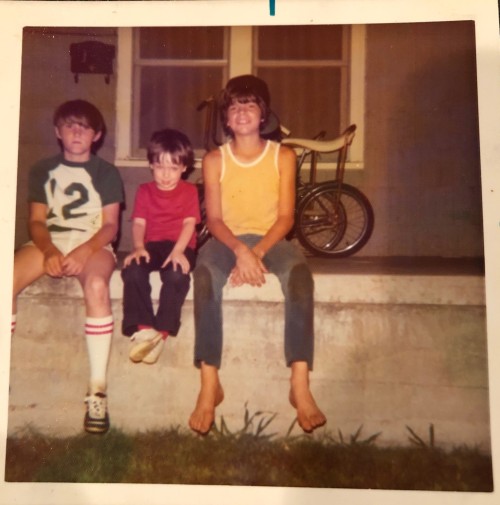
Early 1970s
There was a cardboard box next to the exposed hot water heater on what we called the back porch in the tiny house I grew up in on West Mueller Street. That is where I kept my baseballs and glove, along with any other sports equipment I could get my hands on. I played outside a lot as a kid, and every day, multiple times a day when possible, I would grab something from the box on my way out the back door.
Most of the time I played alone, not that I was a loner per se, but we lived in a neighborhood without other children, so there simply weren’t other options. There is this embarrassingly adorable picture of me as a little boy stage propped on our front porch between a couple of older neighborhood boys, Butch and Joe, who paid attention to me and made me feel important. I dreamed of being a big kid someday and was over the moon excited to have their attention. But by the time I was a big kid, they were long gone.
So I spent untold hours in the backyard, complemented by untold hours shooting hoops on our narrow driveway, but for some reason my mind drifted recently to the many afternoons spent in our tiny front yard as a change of pace. There wasn’t much room to maneuver there, but plenty of free time and childhood imagination could make do.
When it came to baseball, my dad taught me important skills like curving a bill on a baseball cap and breaking in a baseball glove, so I would suit up, and with that intoxicating smell of leather in the air, slip on that Rawlings baseball glove and arch my index finger out the opening and transform into my hero, Ozzie Smith. I would crouch in position and imagine the pitch, then fire a worn-out baseball against the concrete porch at an angle that would make me/Ozzie range from side to side while the crowd held its breath. I would scoop up the ground ball and whirl to fire to first. Playing alone, however, firing to first meant another delivery toward the front porch angled to hit the grass just before thumping the hard concrete resulting in a line drive back to me where I was suddenly a first-baseman stretching to beat the runner as the crowd went berserk.
It was pretty spectacular stuff, and I did this over and over and over again, all the live long day, sweating and basking in imaginary baseball glory.
Every once in a while I would misfire, and the baseball would sail just above the front porch and slam into the siding outside my bedroom window. I would wince knowing that my dad winced when he heard the errant throw, but I never broke the window, and he mercifully never stopped my treasured ritual.
I don’t know what made me think of those countless afternoons in the front yard pounding baseballs against that concrete front porch. There is nothing particularly redeeming about the memory, but for some reason I discovered that I missed it—the innocence of a little boy playing heroic baseball in an imaginary world.
I would like to visit that innocent place again. Maybe that is heaven.




